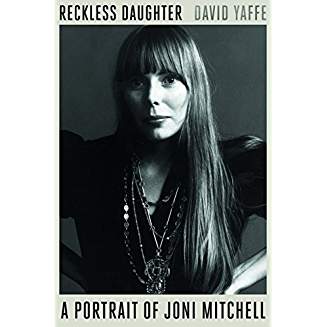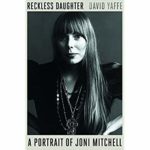
One thing is immediately clear in reading David Yaffe’s Reckless Daughter: A Portrait of Joni Mitchell :
David loves Joni.
In fact, Yaffe loves Mitchell too much to be a clear-eyed biographer. He loves her music. He loves her attitude. He loves her outlook. And he loves her look.
Flip through the book’s 376 pages and you’ll see signs of it everywhere.
“Such beauty emanating from such beauty” (54); “Joni posed, a sort of wood nymph overlooking the sea” (160); “This was the Joni Mitchell of our dreams” (299); and “Looking like a Norse goddess in a stadium full of thugs” (323).
Indeed, Yaffe – who as an assistant professor of humanities at Syracuse University and a professional journalist should know better – makes no attempt to conceal his fan-boy status. And the resulting sycophancy takes away from his telling of story.
From her early days playing folk music in coffee houses in her adopted home in America to Rolling Thunder and the Last Waltz to her final tour in 2000 on a co-bill with Bob Dylan and Van Morrison, and from 1968’s Song to a Seagull to 2007’s Shine, Yaffe goes in-depth to Mitchell’s music and demonstrates he has the knowledge to write this book.
Everything else is less interesting; not because Mitchell’s lived an uninteresting life – quite the opposite – but because the starry-eyed Yaffe can’t quite remove himself from his fascination with his subject. He interviews Mitchell’s ex-husbands, Chuck Mitchell and Larry Klein, and ex-lovers and musical collaborators including David Crosby, Leonard Cohen, Graham Nash, Don Alias and John Guerin among others, and seems slightly jealous of all of them.
Judy Collins, who had a hit with “Both Sides Now” before Mitchell recorded it, Rickie Lee Jones, who questions Mitchell’s jazz bonafides, and other musicians are also quoted and subsequently criticized.
As a result, Reckless Daughter is less a portrait and more a defense of Mitchell. When Yaffe cites critical reviews Mitchell received over the years, he follows up by telling readers why that particular writer was wrong. If a friend deigns to call Mitchell out on her sometimes-wacky behavior, the author dismisses their memories as flawed or simply sour grapes.
And Yaffe fails in two key areas of Mitchell’s life beyond music.
After spending much of the book analyzing how much Mitchell’s decision to put her daughter up for adoption impacted her, he drops the ball when writing about their reunion and subsequent falling out. What happened – and why – is something readers must learn from other sources.
He also devotes only a couple of pages to the brain hemorrhage Mitchell suffered in 2015 and provides no insight into how her health is now.
But for all his fawning, and lack of details on key events in the singer’s life, Yaffe has a encyclopedic knowledge of Mitchell’s musical output and his descriptions of her music quite literally make it play in readers’ minds. I’ve been listening back to Mitchell’s albums while reading the book and getting reacquainted these songs has been a revelation.
That in itself makes Reckless Daughter highly recommended, despite its shortcomings.



No Comments comments associated with this post